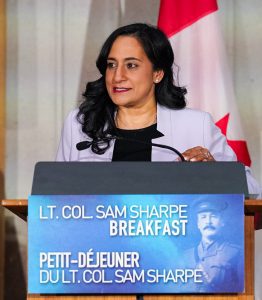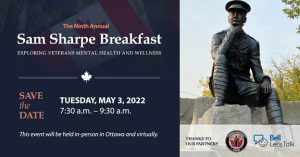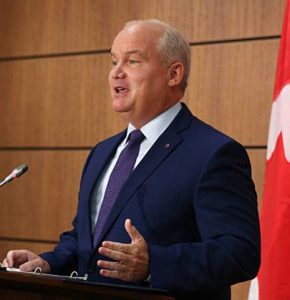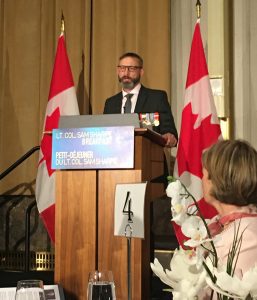
It was a morning dedicated to dealing with invisible wounds among veterans. It brought together former soldiers and first responders who are coping with trauma, support groups trying to help them, and politicians finding workable solutions to post-traumatic stress disorder in Canada.
Among the first to speak, Anita Anand, the minister of national defence, climbed the podium steps on Tuesday to address the gathering. She paused, scanned the faces of those present and offered a personal note.
“This is a difficult time for the military community,” she said. “I wish to recognize and remember officer cadets Jack Hogarth, Andrei Honciu, Broden Murphy and Andres Salek.”
In that moment, the ninth annual Sam Sharpe Breakfast, honouring the memory one of Uxbridge’s early 20th century war heroes, began with a moment of silence recognizing the four young cadets who died in a vehicle crash at Kingston’s Royal Military College this past week.
While not killed on a distant battlefield or during Canadian Forces operations here at home, the freshly graduated RMC cadets, Anand noted, were still part of Canada’s military family. And everybody in the room felt the hurt of their lost lives.
The minister then moved to the essence of the annual breakfast – exploring veterans’ mental health and wellness; she pointed out that today 20 per cent of Canadian Armed Forces personnel have “undeclared mental health disorders” and that such wounds need to be addressed. “Nobody should suffer in silence,” she said.
 I have attended most of these breakfasts and each year try to spend a few moments remembering Sam Sharpe’s story – first elected to the House of Commons as our MP in 1908; organizer of the 116th Ontario Battalion which he led in battle at Vimy Ridge and Passchendaele; one of two serving Great War volunteers who remained a sitting MP while fighting on the Western Front in Europe; and ultimately a victim of suicide, described as shell shock in 1918 when he died, but today recognized as operational stress injury or PTSD.
I have attended most of these breakfasts and each year try to spend a few moments remembering Sam Sharpe’s story – first elected to the House of Commons as our MP in 1908; organizer of the 116th Ontario Battalion which he led in battle at Vimy Ridge and Passchendaele; one of two serving Great War volunteers who remained a sitting MP while fighting on the Western Front in Europe; and ultimately a victim of suicide, described as shell shock in 1918 when he died, but today recognized as operational stress injury or PTSD.

MP Erin O’Toole, who (with LGen Roméo Dallaire) initiated these breakfasts, offered one of Sam Sharpe’s final messages home to friends and family in Uxbridge.
“Whether in Ottawa or in France,” Sharpe wrote from the front in 1917, “I have given my best effort to honour my country.”
It wasn’t enough. Because after he took his own life, on May 25, 1918, Sharpe was omitted from the Book of Remembrance in Ottawa and largely ignored by military history, until O’Toole and MP Jennifer O’Connell co-sponsored a declaration unanimously passed in the House of Commons in 2018 restoring LCol Sharpe’s armed service record and his unique standing in public service while fighting at the front.

At Tuesday’s breakfast, we learned that perhaps no modern veteran has suffered more from undeclared mental health issues than LCol (Retired) Christian Lillington, from Wasaga Beach, Ont.
Through 26 years of service in the Canadian Armed Forces, Lillington attended RMC, rose to senior roles with the armoured corps, training and personnel administration. But PTSD stalked the successful officer when he was deployed with the United Nations in Eritrea in 2001 and through two tours to Afghanistan in 2006 and 2010.
During the latter deployment, his superiors awarded him a Mentioned-in-Dispatches for actions when the Chinook helicopter transporting him and his reconnaissance squadron was shot down.
But his overseas deployment saw the loss of no fewer than 23 or his comrades – drivers, interpreters, medics and others in his command – killed in action. In October 2016, Lillington was diagnosed with PTSD. But his absence from duty was explained to his troops as “a training assignment.” He retired in 2019.
“It did not sit well with me that my illness was explained away,” he has written in his military memoir Parade State Zero: Leaving Military Leadership to Survive.
Indeed, not content trying to put his PTSD behind him, LCol Lillington has dedicated the years since his diagnosis seeking treatment and writing a journal about his journey to wellness. During his talk on Tuesday morning he characterized dealing with PTSD this way:
“If I fell to the ground with a heart attack,” he said, “people would rush to administer CPR. But if I cried out, ‘Help me. I’m having a panic attack,’ nobody would know what to do.”
LCol Lillington speaks regularly at conferences, to fellow veterans (individually and in groups) and to the media, promoting awareness of mental health inside the warrior community. He campaigns on the premise that the most potent antidote to warrior mental illness is interaction with the military family – recovery support team, fellow veterans and blood relations.
“No matter how strong or prepared a soldier is for battle,” he wrote, “even warriors can break.”